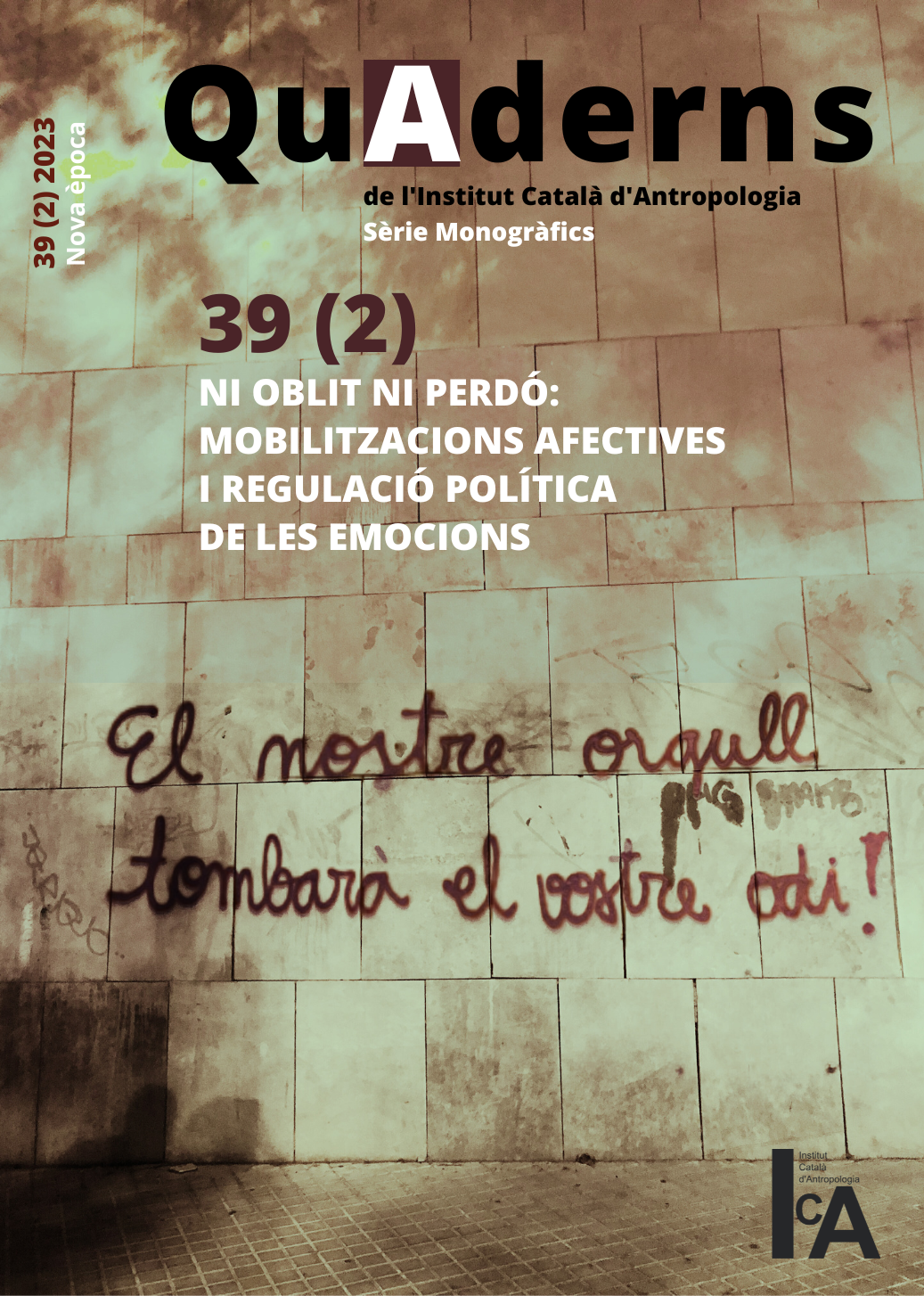"Orgull, ressentiment i menyspreu". Emotions and feeling rules to understand the Catalonia polarization process
DOI:
https://doi.org/10.56247/qua.492Keywords:
Emotions, sociology, feeling rules, polarization, CataloniaAbstract
Based on the literature on the emotional dimension in contentious politics the article offers some analytical tools to understand polarization in the Catalan political and social context. Using the Arlie Hochschild perspective on emotions (emotions as a sociocultural construct), and her research on polarization processes in the US, we will show how the pride of feeling Catalan can be transformed into a rule of feeling of secessionists groups. Also, throughout the text we will explore how emotions influence the construction of "us" versus "them", or how moral emotions such as rage, pride, outrage and indignation, or affective bonds such as hatred and contempt are determining variables in the process of radicalization of the political narrative between sovereigntists and secessionists, conservatives and progressives, and elites and grassroots political groups.
Downloads
Global Statistics ℹ️
|
418
Views
|
158
Downloads
|
|
576
Total
|
|
References
Alexander, J. C. (2004). Toward a Theory of Cultural Trauma. En Alexander, J. C., R. Eyerman, B. Giesen, N. J. Smelser y P. Sztompka (eds.), Cultural Trauma and Collective Identity (pp. 1-30). Berkeley (CA): University of California Press, Altman, I., y Low, S. M. (1992). Place Attachment, Human Behavior and Environment. New York: Plenum Press. DOI: https://doi.org/10.1525/9780520936768
Barbet, P. B. (2020). Encuesta sobre polarización y convivencia en Catalunya, Informe 17/2020. Barcelona: Institut Catal Internacional per la Pau.
Baron-Cohen, S. (2011). The Science of Evil: On Empathy and the Origins of Cruelty. New York: Basic Groups.
Bayard de Volo, L. (2006). The Dynamics of Emotion and Activism: Grief, Gender, and Collective Identity in Revolutionary Nicaragua. Mobilization: An International Journal, 11(4), 461-474. DOI: https://doi.org/10.17813/maiq.11.4.q21r3432561l21t7 DOI: https://doi.org/10.17813/maiq.11.4.q21r3432561l21t7
Davies, K. (2022). Sticking Together in ‘Divided Britain’: Talking Brexit in Everyday Family Relationships. Sociology, 56(1), 97-113. https://doi.org/10.1177/00380385211011569 DOI: https://doi.org/10.1177/00380385211011569
della Porta, D. y Portos, M. (2020). A bourgeois story? The class basis of Catalan independentism. Territory, Politics, Governance, 9(3), 391-411. DOI:10.1080/21622671.2020.1737208 DOI: https://doi.org/10.1080/21622671.2020.1737208
della Porta, D., O’Connor, F. y Portos, M. (2019). Protest cycles and referendums for independence. Closed opportunities and the path of radicalization in Catalonia. Revista Internacional de Sociología 77(4):e142. DOI: https://doi.org/10.3989/ris.2019.77.4.19.005 DOI: https://doi.org/10.3989/ris.2019.77.4.19.005
Ferreira, C. (2021). Entrapped in a failing course of action: Explaining the territorial crisis in 2017. Catalonia, Regional & Federal Studies. DOI: 10.1080/13597566.2021.1907570 DOI: https://doi.org/10.1080/13597566.2021.1907570
Flam, H. (2005). Emotion’s Map: a Research Agenda. En Flam, H. y King, D. (eds.), Emotions and Social Movement (pp.19-40). Abingdon: Routledge.
Flesher Fominaya, C. (2010). Collective Identity in Social Movements: Central Concepts and Debates. Sociology Compass, 4(6), 393–404. DOI: https://doi.org/10.1111/j.1751-9020.2010.00287.x DOI: https://doi.org/10.1111/j.1751-9020.2010.00287.x
Gould, D. (2009). Moving politics: emotion and ACT UP’s fight against AIDS. Chicago, IL: University of Chicago Press. DOI: https://doi.org/10.7208/chicago/9780226305318.001.0001
Gravante, T. (2020). Forced Disappearance as a Collective Cultural Trauma in the Ayotzinapa Movement. Latin American Perspectives. 47(6), 87-102. DOI:10.1177/0094582X20951773 DOI: https://doi.org/10.1177/0094582X20951773
Gravante, T. y Poma, A. (2024). “Si mañana soy yo, si mañana no vuelvo, destrúyelo todo”: Emociones y género en mujeres activistas en México. Géneroos. Revista de investigación y divulgación sobre los estudios de género, 2(3), 88–118. DOI: https://doi.org/10.53897/RevGenEr.2024.03.03 DOI: https://doi.org/10.53897/RevGenEr.2024.03.03
Hobolt, S., Leeper, T., y Tilley, J. (2021). Divided by the Vote: Affective Polarization in the Wake of the Brexit Referendum. British Journal of Political Science, 51(4), 1476-1493. DOI:10.1017/S0007123420000125 DOI: https://doi.org/10.1017/S0007123420000125
Hochschild, A. R. (1975). The Sociology of Feeling and Emotion: Selected Possibilities. En Millman, M. y Kanter, M. (eds.), Another Voice (pp. 280–307). New York: Anchor. DOI: https://doi.org/10.1111/j.1475-682X.1975.tb00339.x
Hochschild, A. R. (1979). Emotion work, feeling rules, and social structure. American Journal of Sociology, 85, 551-575. DOI: https://doi.org/10.1086/227049
Hochschild, A. R. (1983). The Managed Heart: the Commercialization of Human Feeling: Berkeley, CA: University of California Press.
Hochschild, A. R. (2016). Stranger in Their Own Land: Anger and Mourning on the American Right. New York: New Press.
Holmes, M (2004). Feeling beyond rules: politicising the sociology of emotion and anger in feminist politics. European Journal of Social Theory, 7(2), 209-227. DOI: https://doi.org/10.1177/1368431004041752
Iyengar,S. Lelkes, Y., Levendusky, M., Malhotra, N., y Westwood, S. J. (2019). The Origins and Consequences of Affective Polarization in the United States. Annual Review of Political Science, 22, 129-146. DOI: https://doi.org/10.1146/annurev-polisci-051117-073034 DOI: https://doi.org/10.1146/annurev-polisci-051117-073034
Jasper, J. M. (1997). The Art Moral of Protest: Culture, Biography, and Creativity in Social Movements. Chicago, IL: University Chicago Press. DOI: https://doi.org/10.7208/chicago/9780226394961.001.0001
Jasper, J. M. (2011). Emotions and Social Movements: Twenty Years of Theory and Research. Annual Review of Sociology, 37, 285-303. DOI: https://doi.org/10.1146/annurev-soc-081309-150015. DOI: https://doi.org/10.1146/annurev-soc-081309-150015
Jasper, J. M. (2018). The Emotions of Protest: Chicago, IL: University of Chicago Press.
Jasper, J. M. (2021). Estigma, identidad y trabajo de caracterización. Ciencia Política, 16(31), 25-40. DOI: https://doi.org/10.15446/cp.v16n31.97925 DOI: https://doi.org/10.15446/cp.v16n31.97925
Manzo, L. C. y Devine-Wright, P. (2014). Place Attachment. Advances in Theories, Methods and Applications. Abingdon: Routledge. DOI: https://doi.org/10.4324/9780203757765
Polletta, F. y Jasper, J. M. (2001). Collective Identity and Social Movements. Annual Review of Sociology, 27(1), 283-305. DOI: https://doi.org/10.1146/annurev.soc.27.1.283
Poma, A. (2018). La dimensión emocional de los movimientos de resistencia contra represas. Ambiente & Sociedade, 21. DOI: http://dx.doi.org/10.1590/1809-4422asoc0207vu18l3ao DOI: https://doi.org/10.1590/1809-4422asoc0207vu18l3ao
Poma, A. y Gravante, T. (2016). ‘Fallas del sistema’. Un análisis desde abajo del movimiento anarcopunk en México. Revista Mexicana de Sociología, 78(3), 437-467. DOI: http://dx.doi.org/10.22201/iis.01882503p.2016.3.56222.
Poma, A. y Gravante, T. (2018a). Manejo emocional y acción colectiva: las emociones en la arena de la lucha política. Estudio Sociológico, 36(108), 593-616. DOI: 10.24201/es.2018v36n108.1612. DOI: https://doi.org/10.24201/es.2018v36n108.1612
Poma, A. y Gravante, T. (2018b). Emociones, identidad colectiva y estrategias en los conflictos socio-ambientales. Andamios, 36(15), 287-309. DOI: 10.29092/uacm.v15i36.611 DOI: https://doi.org/10.29092/uacm.v15i36.611
Poma, A. y Gravante, T. (2022). Cómo estudiar la dimensión emocional en los movimientos sociales. Campos en Ciencias Sociales, 10(1). DOI: 10.15332/25006681 DOI: https://doi.org/10.15332/25006681.7667
Romanos, E. (2011). Emociones, identidad y represión: el activismo anarquista durante el franquismo. REIS,134, 87-106. DOI: 10.5477/cis/reis.134.87 DOI: https://doi.org/10.5477/cis/reis.134.87
Thompson, E. P. (1971). The Moral Economy of The English Crowd in the Eighteenth Century. Past and Present, 50, 76-136. DOI: https://doi.org/10.1093/past/50.1.76
Downloads
Published
How to Cite
Issue
Section
License
Distributed under the terms of the Creative Commons Attribution 4.0 International Use and Distribution License (CC BY-NC-SA 4.0)




